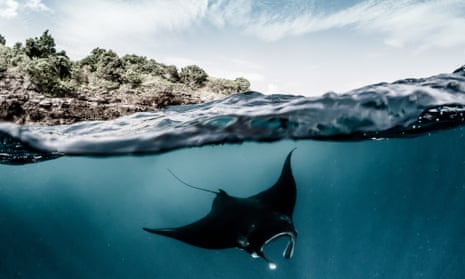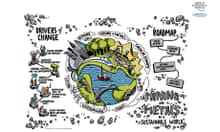US secretary of state John Kerry called for expanding the world’s marine reserves by a factor of 10 on Tuesday, signalling a bolder new US approach to international environmental protection.
In his second environmental initiative this month, Kerry called for greater global co-operation in managing fishing stocks and protecting oceans from pollution and climate change.
He said the State Department would convene a two-day summit in the summer intended to build momentum for greater co-operation on managing the world’s oceans.
“Think of the progress we can make if just 10% of marine areas were protected,” Kerry said in a video address to a high-level oceans meeting hosted by the Economist and National Geographic. “I think that is a goal we should set for ourselves.”
Environment ministers from almost 200 countries signed on to a United Nations strategy to widen marine protection zones to 10% of oceans at a meeting in Japan four years ago.
America has not ratified that treaty, but UN officials said Tuesday Kerry’s adoption of the goals was an encouraging sign.
The initiative was Kerry’s second recent major foray into environmental protection. In a speech in Jakarta earlier this month, the secretary of state ranked climate change as a major global security threat.
“Climate change can now be considered another weapon of mass destruction, perhaps the world’s most fearsome weapon of mass destruction,” Kerry said at the time.
The remarks were ridiculed by conservatives such as Newt Gingrich and the Republican senator John McCain.
But Kerry, who had a strong record on ocean protection and climate change during his years in the Senate, pushed on, signalling new US willingness to take on a leadership role on ocean protection.
He went on in his remarks to the Ocean Summit to set out a three-point plan for safeguarding oceans, starting with marine protection zones, measures to reduce agricultural runoff that is responsible for dead zones, and a global push to bring law and order to high seas, which are rife with illegal fishing.
Kerry said Barack Obama was in favor of a greater global effort to protect the high seas, but he conceded it would be an extremely difficult task. “It is going to take some kind of global understanding. I know people resist and hate the idea,” Kerry admitted. “Each kind of country wants to enforce its own sovereignty, but that is not the way the ocean works.”
Others at the summit, including Achim Steiner, who heads the UN Environmental Programme, said efforts to create a global oceans regime were doomed so long as countries conspired to “paralyse” attempts to enforce fishing and other regulations. “It is very easy to create an institution,” he said.
Steiner also noted that the US – despite its newly launched push on global ocean co-operation – had yet to ratify the UN’s law of the sea treaty.
Kerry agreed it was unlikely the current Senate would ratify that or any other treaty.
But he said there did appear to be growing recognition that the oceans were critical to food supply, especially in the developing world, and economic security, and that there was perhaps an opening for greater international co-operation.
One such step could be setting aside greater areas as marine protection zones.
About 90% of the population of the largest fish species have disappeared over the last 50 years, because of over-fishing and environmental degradation.
Two-thirds of the world’s coral reefs are damaged or dissolving into the acidic waters caused by carbon dioxide emissions.
Scientists agree that marine protection zones give fish and other species breathing room to make a comeback.
Some countries agreed, seeing economic potential in conservation. Indonesia last week set aside a six million-square kilometre sanctuary for manta rays.
And yet only a fraction of the world’s oceans enjoys such protections.
Less than half of 1% of the world’s oceans enjoy full protection under no-take marine reserves, according to the Pew Charitable Trusts. More than 15% of land areas are under this kind of protection.




Comments (…)
Sign in or create your Guardian account to join the discussion